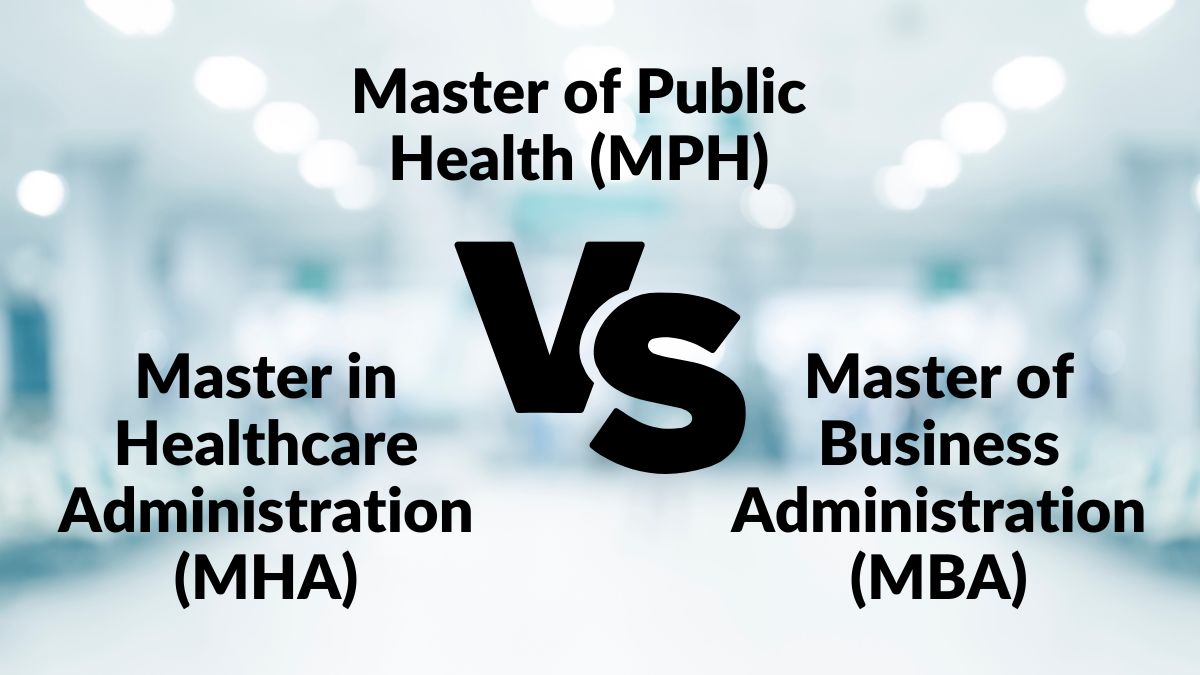Masters in Healthcare Administration

Contents
- Introduction to Masters in Healthcare Administration
- Difference between MHA, MPH, and MBA
- Benefits of Masters in Health Administration Course
- Career after studying Masters in Healthcare Administration in USA
- Masters in Healthcare Administration Jobs
- Does Masters in Healthcare Administration degree financially worthwhile?
- Eligibility to study Masters in Healthcare Administration
- Masters in Healthcare Administration Salary
- Is it worth study a Masters in Healthcare Administration in the USA?
- Conclusion
Introduction to Masters in Healthcare Administration
Students who enroll in the Masters in Healthcare Administration program are prepared for positions in the healthcare sector. The degree opens up opportunities for rising technical or managerial positions in hospitals and consulting firms serving the healthcare industry. Students will be asked to act as change agents and educators for others. Students and professionals who hold a Master of Healthcare Administration (MHA) degree can progress in their fields.
Additionally, MHA graduates look for employment prospects in consultancy, pharmaceutical, medical device, and payer businesses. The services provided in a range of care delivery contexts are planned, directed, and coordinated by these leaders. They need to keep up with the rapidly evolving laws, rules, and technology in the field of health care and assist their business in doing the same.
Difference between MHA, MPH, and MBA
For healthcare management, there are three primary master’s degree programs. Though each degree has a different concentration, they can all lead to some of the same employment. Healthcare workers are seen to be ideal candidates for the Master of Business Administration (MBA), Master of Public Health (MPH), and Master in Healthcare Administration (MHA) programs.
| MHA | MPH | MBA |
|
|
|
|
|
|
Benefits of Masters in Health Administration Course
An advanced degree in healthcare administration that qualifies graduates for leadership roles in the field is the Master of Healthcare Administration (MHA). Health policy, healthcare legislation, risk management, informatics, data management, and many other topics are covered in-depth in the MHA’s study of healthcare systems.
In addition to this, a substantial amount of research demonstrates that obtaining the MHA results in greater wages. Managers of medical and health services made an average yearly compensation of about $100,900, according to statistics. In this period, the top 10% of the field made $180,000 annually.
Many hospital managers future-proof their professions by earning a Master in Health Administration (MHA). Apart from that, this graduate degree helps advance the careers of seasoned healthcare managers by preparing students for entry into the industry. You may become the executive director of a hospital system or a nursing care administrator with the Masters in Healthcare Administration.
Career after studying Masters in Healthcare Administration in USA
Earnings for the top 10% of masters in healthcare administration degree holders exceed 186,600 USD annually. Entry-level roles that are not in management pay differently, with those needing a master’s degree often paying more. Renton, Granton, Confluence Health, and other well-known employers frequently seek graduates with degrees in health management. The following are some of the career opportunities after completing the course.
- Health Information Manager
- Medical Administrator
- Medical Office Administrator
- Medical Office Manager
- Quality Assurance Manager
- Admitting Manager
Masters in Healthcare Administration Jobs
You have a wide range of options available to you with a masters in healthcare administration degree. To name a few, you can work in finance, human resources, technology, or policymaking. The apparently limitless variety may prove to be an unwelcome curse for certain kids. One expert claims that “people just don’t know what to do with [this] degree.” Here are some Masters in Healthcare Administration jobs.
1) Healthcare Providers
According to the Statistics, hospital administrators make up around 30% of all healthcare administrators. Masters in healthcare administration can also find employment in hospitals, nursing homes, and senior care facilities. Administrator, director of business development, executive director, and practice manager are just a few of the various job titles you may look into in this industry.
2) Healthcare Suppliers
Some students who complete Masters in healthcare administration go on to work in the consulting and pharmaceutical businesses. Consultancy, marketing manager, buyer, sales director, director of market research, faculty/instructor, product manager, and analyst are among the occupations to look into in this industry.
3) Health Insurance Organizations
One of the fastest-growing sectors of the American healthcare business is insurance and health maintenance organizations. For individuals looking for entry-level careers, some of the job titles in this industry include research analyst, utilization manager, quality improvement coordinator, and client manager.
Also read about: Top 10 best paying jobs in healthcare Sector
4) Healthcare Consultant
Traveling from one institution to another as a healthcare consultant, you could pinpoint strengths and flaws and propose improvement strategies. Having administrative expertise and a track record of successfully reviving businesses might be beneficial. You should also love meeting new people, have good communication skills, and enjoy traveling.
Does Masters in Healthcare Administration degree financially worthwhile?
You may be uniquely qualified for leadership positions in healthcare if you have an Masters in Healthcare Administration. An MHA typically earns roughly $80,000 per year. Some experts in this sector earn considerably more than $100,000 annually. The employment forecast for this industry is positive because it also comprises administrative workers.
Eligibility to study Masters in Healthcare Administration
- You require a four-year bachelor’s degree in health, health administration, and other business-related courses with all majors available if you want to apply for a Master of Hospital Administration in the USA. Each university will have a different minimum GPA requirement.
- Additionally, statistics, economics, and financial accounting may be required by some colleges for your bachelor’s degree.
- The GRE may also be required by some colleges.
- A TOEFL score of at least 90 or an equivalent is required to demonstrate your English language proficiency.
Masters in Healthcare Administration Salary
| Job Role | Salary (Annually) |
| Health Information Manager | $110000 |
| Medical Administrator | $100000 |
| Medical Office Administrator | $88000 |
| Quality Assurance Manager | $136000 |
| Administrative Director | $150000 |
Is it worth study a Masters in Healthcare Administration in the USA?
Yes, it is predicted that employment in the healthcare sector would increase by 20% over the next 10 years. The varied duties of contemporary administrators are covered by a Master of Health Administration (MHA). Learning medical jargon, health legislation, and healthcare informatics can help you become more comfortable interacting with both clinical and corporate personnel.
Conclusion
You can be prepared to work as a healthcare leader by earning a Masters in Healthcare Administration (MHA) degree. Administrators oversee issues with personnel, such as ensuring that the proper candidates are chosen for each position and that employees have access to the resources and training, they require. You could work at a long-term care home, a group medical practice a hospital, or a clinic.
Also read about: Registered Nursing Program Online








